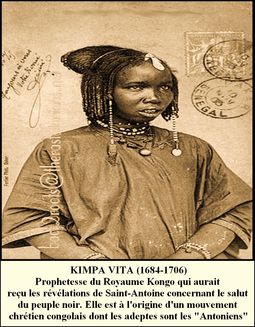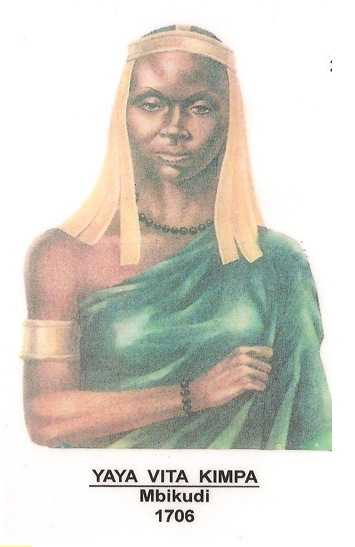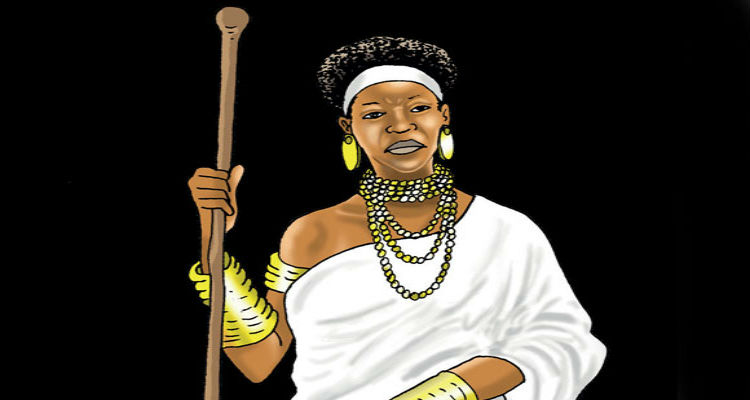 Kimpa Vita, also known as Dona Beatriz (1684–1706), was a Kongo prophetess and leader of her own Christian movement, Antonianism. She is known as the Mother of the African revolution, as she was one of the first African women to fight against European dominance in Africa during the colonial period.
Kimpa Vita, also known as Dona Beatriz (1684–1706), was a Kongo prophetess and leader of her own Christian movement, Antonianism. She is known as the Mother of the African revolution, as she was one of the first African women to fight against European dominance in Africa during the colonial period.
Kimpa Vita fought against all forms of slavery, and tried to reconcile Christianity with African religions and beliefs, teaching people that black saints mingled with whyte saints in paradise. This was revolutionary, since Catholic priests in the area (Capuchins) taught that only whyte saints could be found in heaven. While still in her teens, she started a non-violent anti-colonial movement to liberate the Kingdom of Kongo and return it to its former glory. She led thousands of her people to rebuild and repopulate Mbanza Kongo, the capital of the once glorious unified Kingdom of Kongo. She was burned at the stake as a which for heresy.
Kimpa Vita was born near Mount Kibangu into a family of the Kongo nobility soon after the death of King António I (1661–65). As Kongo had been a Catholic kingdom for two centuries before her birth, she was baptised into the Roman Catholic church at birth. It is believed that she was connected to King António I who died at the battle of Mbwila (Ulanga) a battle orientated around the removal the Portuguese from his region. Following António I death was a time of internal strife, political unrest and civil war.
As a child she had ‘gifts’, constantly saw visions and dreamt of playing with angels. Due to her innate spirituality, Kimpa Vita was trained as a (Shaman) Nganga marinda, a individual who consults the supernatural world to solve problems within the community. With her training as a shaman and her identification as a Christian, Kimpa Vita began to be recognized as a prophetess. In 1704 at the age of 20 she had a near death experience when she appeared to die of a fever. When she had been resuscitated she believed that she now spoke with the voice of the patron saint of Kongo, and also incidentally the patron saint of Portugal, St. Anthony of Padua. She believed Saint Anthony became incarnate in her body and so she became the physical manifestation of the saint, who addressed the kingdom’s problems through her.
 Kimpa Vita concerned with the restoration, spiritually and politically, of the Kongo Kingdom created the first Black Christian movement in Sub-Saharan Africa, which taught that Jesus and other early Christian figures were from the Kongo Kingdom. She placed the birth of Jesus Christ within the Kongo and identified the city of M’banza-Kongo (called Sao Salvador by Portuguese) as the new Bethlehem claiming that God wanted it restored as the capital of the Kingdom. This movement known as Antonianism was set firmly within Kongo history and geography. From her visions she believed Kongo must reunite under a new king and Antonianism was a way of doing this.
Kimpa Vita concerned with the restoration, spiritually and politically, of the Kongo Kingdom created the first Black Christian movement in Sub-Saharan Africa, which taught that Jesus and other early Christian figures were from the Kongo Kingdom. She placed the birth of Jesus Christ within the Kongo and identified the city of M’banza-Kongo (called Sao Salvador by Portuguese) as the new Bethlehem claiming that God wanted it restored as the capital of the Kingdom. This movement known as Antonianism was set firmly within Kongo history and geography. From her visions she believed Kongo must reunite under a new king and Antonianism was a way of doing this.
Kimpa conspired with the general of Pedro IV, one of the contenders for the throne, but she was captured near her hometown and tried under Kongo law. Both Kimpa and her baby – conceived by her “guardian angel” – were burned at the stake for heresy, at the instigation of Capuchin missionaries on July 2, 1706. In 1710, the perpetrators sent a report of their “mission” to the pope, after having organized the persecution of her followers. She died when she was 21.
The Anthonian prophetic movement outlasted her death. Her followers continued to believe that she was still alive, and it was only when Pedro IV’s forces took São Salvador in 1709 that the political force of her movement was broken, and most of her former noble adherents renounced their beliefs and rejoined the church.
Source:
http://diasporicroots.tumblr.com/
http://racabrasil.uol.com.br/colunistas/lideranca-feminina-africana/2123/
https://en.wikipedia.org/wiki/Kimpa_Vita



